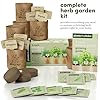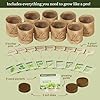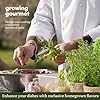Land Guard 2Pcs Galvanized Raised Garden Bed Kit, Galvanized Planter Oval Large Metal Raised Garden Boxes Outdoor for Vegetables…
$49.99 (as of 14:16 GMT -05:00 - More infoProduct prices and availability are accurate as of the date/time indicated and are subject to change. Any price and availability information displayed on [relevant Amazon Site(s), as applicable] at the time of purchase will apply to the purchase of this product.)Land Guard 8×4×2 ft Galvanized Raised Garden Bed Kit, Galvanized Planter Raised Garden Boxes Outdoor, Large Metal Raised Garden Beds for Vegetables.
23% OffComposting has become an increasingly popular topic in recent years, and it’s no wonder why. With more people becoming aware of the importance of sustainability, composting offers a simple yet effective solution to reducing waste while also creating nutrient-rich soil for gardening. In this blog post, we will explore why composting is the ultimate solution for sustainable living.
Introduction to Composting
Composting is the process of breaking down organic matter such as food scraps, yard trimmings, and animal manure into a nutrient-rich soil amendment called compost. This process involves using microorganisms such as bacteria, fungi, and worms to break down the material over time until it becomes a dark, crumbly substance that can be used as fertilizer for plants.
The Benefits of Composting for Sustainable Living
There are many benefits to composting for sustainable living. First and foremost, composting reduces the amount of organic waste that ends up in landfills. Organic waste decomposing in a landfill releases methane gas, which is a potent greenhouse gas that contributes to climate change. By composting your organic waste instead, you can prevent the release of methane and create a valuable resource for your garden. Additionally, composting helps improve soil health by adding important nutrients and improving soil structure. It can also help conserve water by retaining moisture in the soil, reducing the need for irrigation. Finally, composting can save you money on fertilizers and reduce your overall environmental impact.
How to Get Started with Composting at Home
Getting started with composting at home is easy! All you need is a bin or pile where you can place your organic waste, some brown materials (such as leaves or shredded paper) for carbon, and some green materials (such as fruit and vegetable scraps or grass clippings) for nitrogen. You can also add other ingredients like eggshells, coffee grounds, or even animal manure to boost the nutrient content of your compost. The key is to keep your compost balanced between greens and browns, and to turn it regularly to aerate the material and encourage decomposition.
Common Mistakes to Avoid when Composting
While composting is relatively straightforward, there are a few common mistakes that can slow down or stop the process altogether. One mistake is not providing enough airflow to the compost pile. Without adequate oxygen, the microorganisms responsible for breaking down the material won’t be able to do their job effectively. Another mistake is not turning the compost pile frequently enough. Turning the pile helps to aerate the material and distribute moisture evenly throughout the pile. Finally, another mistake is adding too much of certain materials, such as meat or dairy products, which can attract pests and cause odors.

Using Compost as a Natural Fertilizer
Once your compost has fully broken down, you can use it as a natural fertilizer for your garden. Compost contains all sorts of beneficial nutrients such as nitrogen, phosphorus, and potassium, as well as micronutrients like iron and manganese. Using compost as a fertilizer can help improve plant growth and yield, and it can also help improve soil health over time.
Conclusion: Why Composting is the Ultimate Solution for Sustainable Living
In conclusion, composting is truly the ultimate solution for sustainable living. Not only does it reduce waste and provide a valuable resource for gardeners, but it also promotes soil health, conserves water, and saves money on fertilizers. Whether you live in an urban or rural area, composting can be done by anyone with a little effort and attention. So what are you waiting for? Start composting today and join the movement towards a more sustainable future.
Related Content
- STRY trg on vermi-composting commences – Nagaland Post
- UMass Lowell, city mark Earth Day with grants for ‘green’ projects
- <b>Composting</b>: A Recipe for Success
- Food or fuel? Australian biotech adapts yeast to give us both
- My Sunday: The Sustainability Trust chief executive Georgie Ferrari | Stuff.co.nz















































